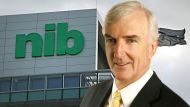When NSW couple Edna and Bill Williams were told how much they'd be expected to pay for their private health insurance next year - $17,594 - they were so shocked they couldn't sleep for three nights.
They are already paying top dollar for their BUPA policy: $912 a month, well over the $388 national average for high-level cover. But after April 1, that will rise to $1466 a month - a staggering 60 per cent increase.
More BusinessDay Videos
Forget banks, your health insurance is a rip-off
The utter gall of NIB in boasting about ripping off the public makes the banks look nice.
"We thought, 'that can't possibly be right'. How on earth do we just pluck an extra $7000 out of the air?" says 78-year-old Mrs Williams. Her husband is 86.
The company offered no explanation to the couple for the steep increase, simply pointing to the rising cost of healthcare services.

Millions of Australians are considering ditching their private health insurance in the face of relentless price rises and diminishing value for money. Nationally, premiums will rise by an average of 4.8 per cent next month.
But Edna and Bill are in a particularly unenviable position.
British citizens, they moved to Australia in 2000 on retirement visas to be close to their adult children. One of the requirements of their visas was that they take out private health insurance because they're not eligible for a Medicare card.
They were with Medibank Private for 14 years but were tempted in 2013 into switching to BUPA, which was initially offering a better rate.

Threatened with this precipitous rise they tried to flee back to Medibank but were told they were not taking on any new customers on overseas visitor visas. BUPA now has an effective monopoly on people in their situation - about 800 of them.
"I read letters in the paper about people complaining it's costing them another $300 a year for their whole family," Ms Williams said. "At least they can shop around and find someone a bit cheaper but we can't. We're stuck with the one company."
The couple has complained about the "unconscionable" increase to the Commonwealth Private Health Insurance Ombudsman.
Now they face a choice.
Their British pensions are their only source of income and will only stretch so far. So do they downgrade to basic cover, even though they're at the age where knee and hip replacements and other such procedures often become necessary? Or do they return to England, a world away from their children and grandchildren?
A spokesman for BUPA said it increased its prices "simply to break even" after losing $11 million on the product in four years.
"Due to the cost of this type of insurance all other funds have walked away from offering it," he said.
"We had a choice of doing that too but have elected to continue offering the service at an increased rate. On average over the last four years the claims that we paid on this policy were 60 per cent higher than the premium received which is why we've had to raise prices by such an unusually high amount."
A Galaxy Research study released this week by health insurance experts iSelect revealed 77 per cent of Australians with private health insurance were reconsidering their policy ahead of April 1, with 2 million planning to downgrade or cancel.
This year's premium hike is 3.3 times the rate of general inflation. Consumer group CHOICE says health insurance customers have been hit with an 54.6 per cent cumulative price hike since 2009.
The immigration department said that as of the end of the last year there were 5428 retirement visa holders, of whom 3225 were in Australia. The vast majority - 3165 - were from Britain.
Retirement visa holders are regarded as temporary residents so do not have access to Medicare or Centrelink. Designed to enable people to spend some of their retirement years in Australia, the visa was closed to new applicants in 2005.















